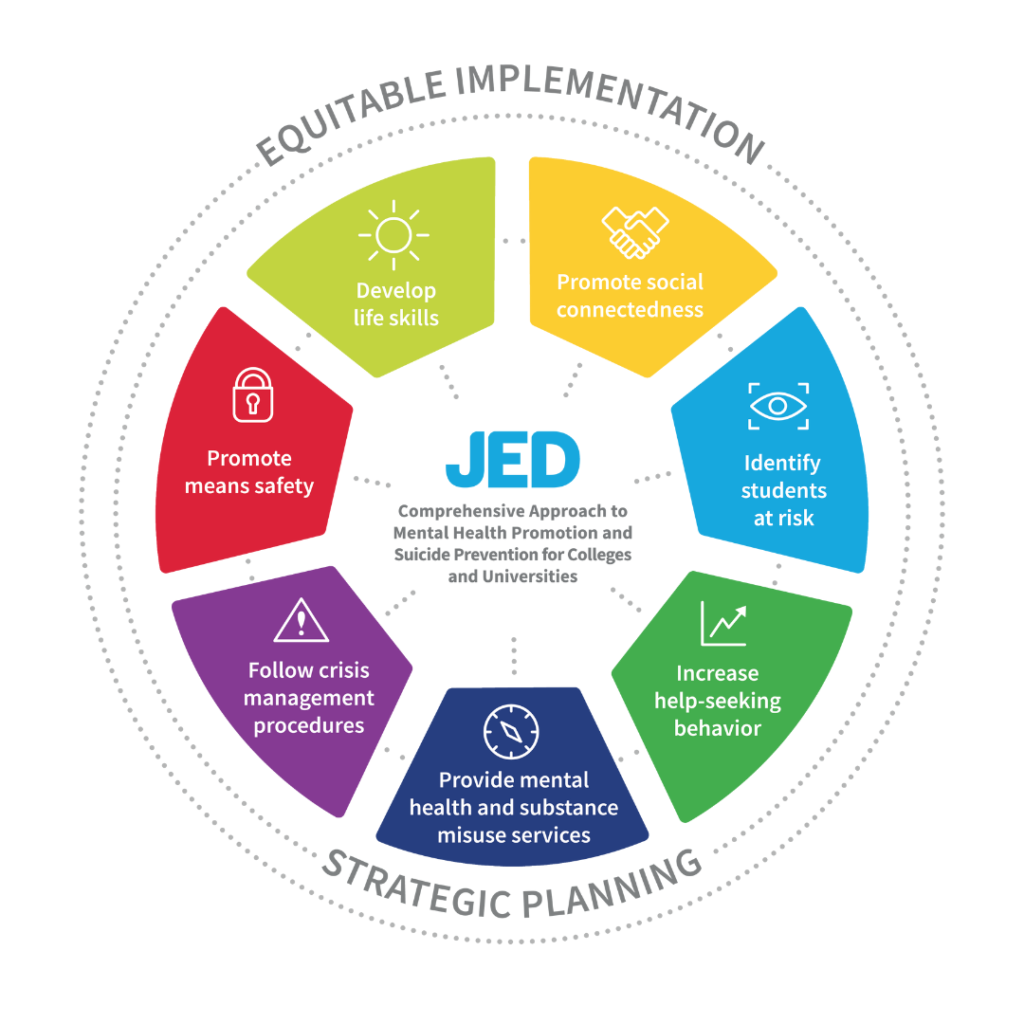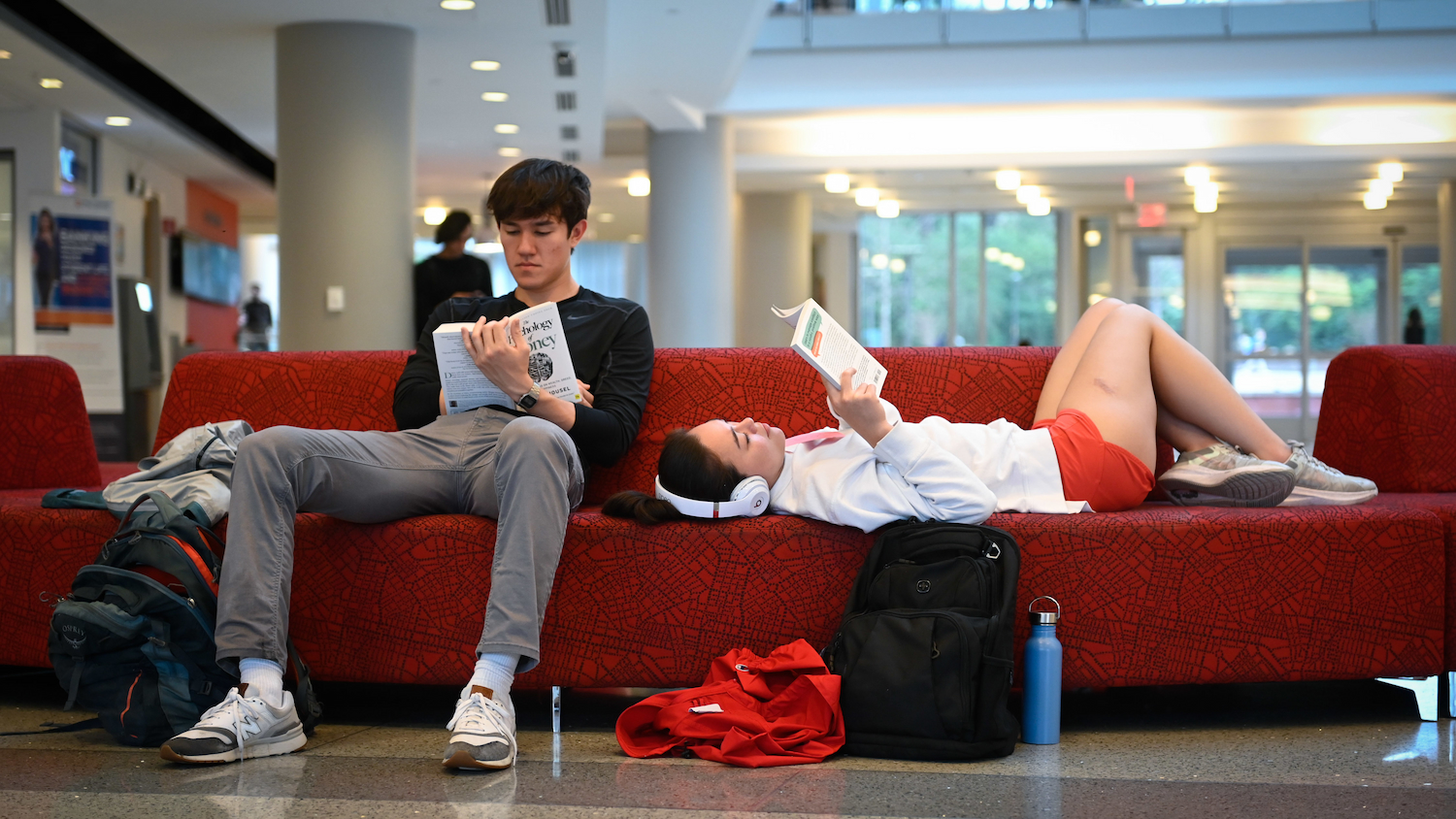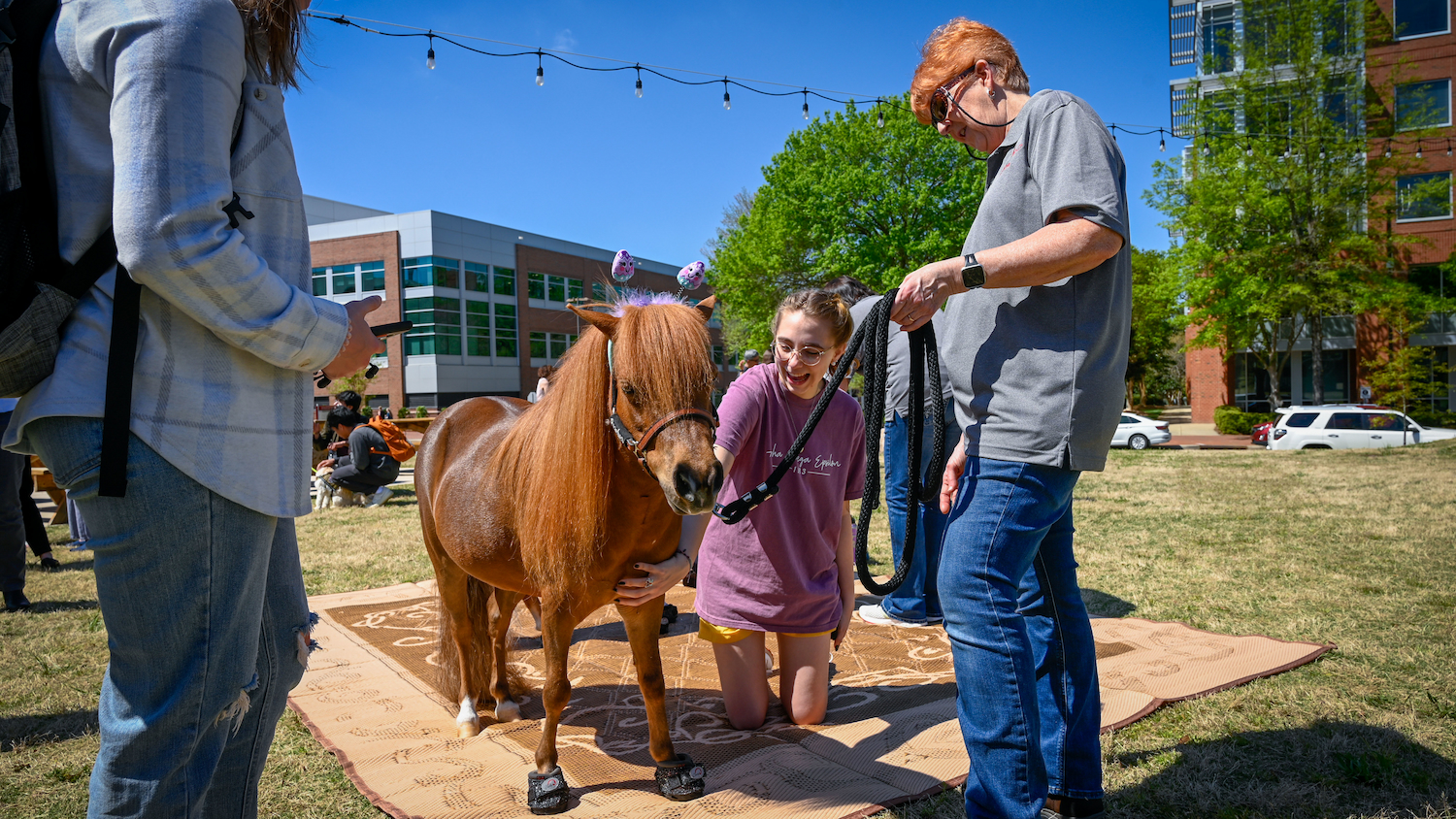JED Campus
NC State is proud of our strategic partnership with JED Campus, a flagship initiative of The Jed Foundation.
NC State is a JED Campus!
JED Campus fosters a collaborative process, building upon existing student mental health and suicide prevention efforts. It offers colleges and universities expert support, evidence-based best practices and data-driven guidance to enhance student mental health and prevent suicide.
JED’s Comprehensive Approach
JED Campus believes in a comprehensive public health approach to promoting mental health and preventing suicide. This evidence-based model is used to assess current campus efforts, identify existing strengths and find areas for improvement.
Develop life skills
Supporting life skills education is valuable in teaching healthy ways to cope with the stress of college life. Some life skills necessary to a student’s well-being include managing friendships and relationships, problem solving, decision making, identifying and managing emotions, healthy living and finding life purpose, meaning and identity.
Promote social connectedness
Research has shown that loneliness and isolation are significant risk factors for mental health problems – including suicidal behavior. Therefore, supportive social relationships and feeling connected to campus, family and friends are protective factors that can help lower risk.
Identify students at risk
It is important to take action to identify students at risk for mental health problems and/or suicidal behavior and also to promote emotional health awareness among those who interact with students the most — “gatekeepers” such as residence hall staff, academic advisors, faculty and even fellow students — as it is vital for these people to be able to recognize and refer a student who might be in distress.
Increase help-seeking behavior
Many students who need help may be reluctant or unsure of how to seek it out. Obstacles to help seeking include lack of awareness of mental health services, skepticism about the effectiveness of treatment, prejudices associated with mental illness and uncertainty about costs or insurance coverage. Campuses should engage in a variety of activities designed to increase the likelihood that a student in need will seek help.
Provide mental health and substance misuse services
It is essential to offer accessible, consistent and high-quality mental health services to students. To make mental health and substance use care more comprehensive, it should include strong and flexible services, adequate staffing levels, flexibility in treatment approaches and clinic hours that are reflective of student schedules. Since most college clinics are free, the length of treatment is often limited. Therefore, it is important that campus mental health services assist students in finding off-campus resources that can provide long-term care if needed.
Follow crisis management procedures
The campus should have access to a well-publicized 24/7 crisis phone and/or chat line either through campus resources or local/national services. There should be a process in place to share information (as legally appropriate) between local ERs and school health and/or counseling services.
Restrict access to potentially lethal means
It has been well established that if the means to self-harm are removed or limited in an environment, it can prevent suicide and even limit accidental deaths. This is called “means restriction.” Limiting students’ access to weapons, poisonous chemicals, rooftops, windows or other high places are all means restriction activities. Each campus should do an environmental scan for potential access to lethal or dangerous means.
Advisory Group
This interdisciplinary group is leading the JED process and implementation on campus.
| Alicia Lecceardone, Associate Dean College of Textiles | Meghan Luzader, Director of Residence Life University Housing |
| Angel Bowers, Director Prevention Services | Monica Osburn, Executive Director Counseling Center and Prevention Services |
| Betsy Lanzen, General Counsel University Legal | Nancy Whelchel, Assistant Vice Provost Institutional Strategy and Analysis |
| Charles Clift, Assistant Vice Provost Registration and Records | Pablo Campos, Counselor Counseling Center |
| Conner Hartis, Campus Police | Pete Fraccaroli, Director of Facilities and Business Operations University Housing |
| Courtney Hinton, Interim Medical Director Campus Health Services | Shannon DuPree, Director Wolfpack Wellness |
| Justine Hollingshead, Assistant Vice Chancellor Office of Student Life and Advocacy | Sheri Schwab, Vice Provost Office of Equal Opportunity |
| Katharine Stewart, Professor College of Humanities and Social Sciences | Summia Rahman, Graduate Student Representative |
| Kelly Vance, Wellness, Childcare and Perks Coordinator University Human Resources | Thomas Jackson, Graduate Student Representative |
| Kim Nguyen-Dinh, Addictive Behaviors Coordinator Counseling Center | Tricia Buddin, Advisor Academic Advising |
| Mary Cole Pike, Executive Director of Communications University Communications |
Working Groups
Grouped based on overarching areas of focus.
- Identify and Responding to At-Risk Students
Mental Health Training for Faculty, Staff and Students - Means Safety
- Policies and Procedures
(PRRs, Leave Policies, Tuition Insurance, etc) - Social Connectedness
- Prevention and Substance Misuse
Alcohol and Other Drug Services - Data-Driven Strategic Planning
Before JED Campus
How We Got Here
Before becoming a JED Campus, Division of Academic and Student Affairs Vice Chancellor and Dean Doneka R. Scott initiated a Student Mental Health Task Force (SMHTF). Implementation teams have completed many of the SMHTF initiatives. The JED Campus advisory group has absorbed the initiatives that were not complete. Many of the goals of the SMHTF aligned with the strategic plan for JED.
Recommendations absorbed by JED Campus Advisory Group
| Recommendations | Team Lead(s) | Status |
|---|---|---|
| Become a JED Campus | Monica Osburn, Executive Director, Counseling and Prevention Services | NC State is in year two of a four-year process to become a JED Campus. |
| Implement widely available mental health screening for students, including education on resources available | Absorbed by the JED Campus implementation team. | |
| Continue to address food insecurity, housing instability and other environmental factors | Kaly Wall, Academic Advisor; John Classen, Director of Graduate Programs; Mike Giancola, Asst. Vice Chancellor and Student Ombuds, DASA | March 2024 report from Dr. Mary E. Haskett and the NC State Steering Committee on Food Housing Insecurity. Work will continue through the JED Campus initiative. |
| Provide additional student support services and community engagement programming opportunities on Centennial Campus | Donna McGalliard, Assoc. Vice Chancellor and Assoc. Dean, DASA | Final recommendations. Work will continue through the JED Campus initiative. |
| Add additional interventions and opportunities that promote a sense of belonging, connection and community | Michele Kurtz, Director, Student Leadership and Engagement | Separate from the implementation team, new opportunities to promote well-being have been, and are being continually developed across campus and promoted on Wolfpack Wellness. Work will continue through the JED Campus initiative. |
| Modify the Health and Exercise Studies GEP courses required for every undergraduate student, to increase wellness and life skills education | Department Head, Health and Exercise Studies | On hold until a department head for HES is hired. |
| Create a common core first-year experience course (folded into GEP discussion) | Carrie Zelna, Sr. Assoc. Vice Chancellor, DASA; Holly Hurlburt, Assoc. Dean, DASA | On hold until GEP discussion begins. |
| Implement means restrictions in the built environment | Lisa Zapata, Sr. Assoc. Vice Chancellor, DASA | Created and installed 1,600 permanent mental health resource signs. Work will continue through the JED Campus initiative. |
| Create more gathering spaces that cultivate community | Created a green spaces online map. Work will continue through the JED Campus initiative. | |
| Continue to address financial barriers to success among students (particularly grad students) | Nate Miner, Assoc. Vice Chancellor, DASA | In progress |
| Provide student services for distance education students | In progress | |
| Examine regulations related to academic expectations (REG 02.20.03 Attendance, REG 02.20.14 – Test and Examinations, REG 02.20.13 – Teacher Availability to Students) | Katharine Stewart, Sr. Vice Provost for Faculty and Academic Affairs; Ontario Wooden, Sr. Assoc. Dean, DASA | In progress |
| Ensure course expectations and workload align with credit hours earned (REG 02.20.05 – Course Load, REG 02.05.02 – Length of Time to Graduation) | In progress | |
| Coordinate exams at the institutional or departmental levels | In progress | |
| Add a syllabus statement on mental health (REG 02.20.07 – Course Syllabus) | In progress | |
| Examine “grades” regulations (REG 02.50.03 Grades and Grade Point Average, REG 02.45.02- Grades and Credit in Graduate Courses, REG 02.20.16 – Undergraduate Grade Exclusion, REG 02.20.06 Course Repeat Regulation, REG 02.05.01 – Continuation of Undergraduate Enrollment (Academic suspension)) | In progress | |
| Undergraduate leave of absence (new proposed) | Charles Clift, Asst. Vice Provost, University Registrar, EMAS | In progress |
| Examine current regulations for withdrawals/leaves of absence/adding or dropping courses (REG 02.05.04 – Term Withdrawal from the University, REG 02.20.02 – Adding and Dropping Courses, REG 02.20.15 – Credit Only Courses, REG 07.55.03 Refunds) | In progress |
Completed Individual Recommendations
| Recommendations | Team Lead(s) | Status |
|---|---|---|
| Improve the usability of the Counseling Center website | Justin Hammond, Asst. Vice Chancellor, DASA | Complete. Visit counseling.dasa.ncsu.edu |
| Create a one-stop website for mental health and well-being resources | Justin Hammond, Asst. Vice Chancellor, DASA | Complete. Visit wellness.ncsu.edu |
| Schedule wellness days each semester and assess the benefit | Charles Clift, Asst. Vice Provost, University Registrar, EMAS | Complete. Assessment is ongoing. See the academic calendar for dates. |
| Embed clinicians across campus | Monica Osburn, Executive Director, Counseling and Prevention Services | Complete. See the list of embedded clinicians. |
| Hire and retain more clinicians and case managers | Monica Osburn, Executive Director, Counseling and Prevention Services | Complete. One psychiatrist, five counselors, and one administrative support associate have been hired since Feb. 2023. |
| Review NC State postvention protocols | Donna McGalliard, Assoc. Vice Chancellor and Assoc. Dean, DASA | Complete. Postvention at NC State. |
| Compile and advertise courses that support well-being | Wellness Advisory Committee | Complete. See Academics and Research. |
| Create a campuswide theme centered on wellness and sense of belonging for 2023-24 academic year | Yarneccia Dyson, Department Head and Professor, School of Social Work | Separate from the implementation teams, a campuswide communication plan was developed to “Lighten Your Pack” at NC State. |
| Create a faculty toolkit and other resources for faculty | Diane Chapman, Director, Office of Faculty Development | Complete. See final report. Work will continue through the JED Campus initiative. |
| Create a Dean of Students-type position in DASA | Doneka Scott, Vice Chancellor and Dean, DASA | Complete. Office of Student Life and Advocacy |
| Increase prevention efforts, including changes to Prevention Services | Wellness Advisory Committee | Complete. Case managers and an associate director in Prevention Services were added. |
| Review existing advising models across the university | Kesha Reed, Assoc. Vice Chancellor and Assoc. Dean, DASA | Complete. See final report. Work will continue through the Academic Advising Review Committee. |
| Add a health and wellness component to performance appraisals for employees (developmental) | Tim Danielson, Assoc. Vice Chancellor, University Human Resources | Complete. Will not pursue. |
Completed Grouped Recommendations
| Recommendations | Group | Status |
|---|---|---|
| Increase access to counseling services and decrease the wait time (teletherapy platform) | Technology | Complete. Learn more about our teletherapy platform. |
| Implement a peer mentoring support program | Technology | Complete. Visit prevention.dasa.ncsu.edu/togetherall to join the online support community. |
| Provide a wellness app for the NC State Community | Technology | Complete. Visit wellness.ncsu.edu/headspace to access Headspace |
| Require students to complete a well-being skills training module | Training | Complete. All first-first year students required to complete a well-being skills module starting in fall 2023. |
| Require/encourage faculty and staff to complete training to learn how to recognize early warning signs of mental health distress | Training | Complete. Work will continue through the JED Campus initiative. |
| Implement means restrictions in the built environment | Physical Environment | Created and installed 1,600 permanent mental health resource signs. Work will continue through the JED Campus initiative. |
| Create more gathering spaces that cultivate community | Physical Environment | Created a green spaces online map. Work will continue through the JED Campus initiative. |


